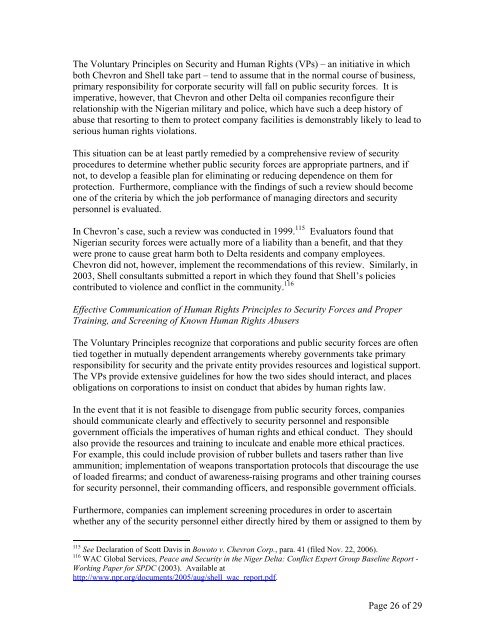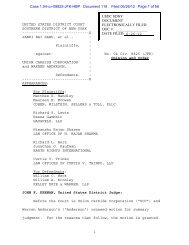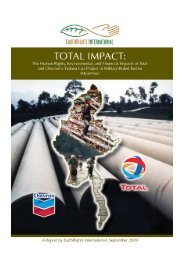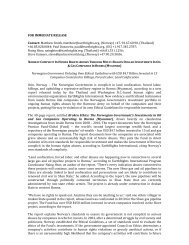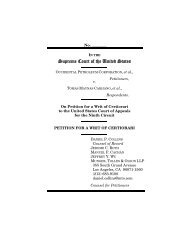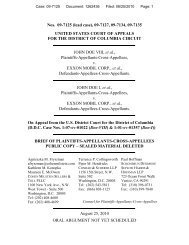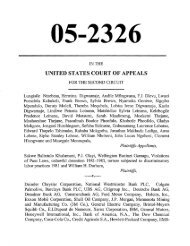The Oil Industry and Human Rights in the Niger Delta - EarthRights ...
The Oil Industry and Human Rights in the Niger Delta - EarthRights ...
The Oil Industry and Human Rights in the Niger Delta - EarthRights ...
You also want an ePaper? Increase the reach of your titles
YUMPU automatically turns print PDFs into web optimized ePapers that Google loves.
<strong>The</strong> Voluntary Pr<strong>in</strong>ciples on Security <strong>and</strong> <strong>Human</strong> <strong>Rights</strong> (VPs) – an <strong>in</strong>itiative <strong>in</strong> whichboth Chevron <strong>and</strong> Shell take part – tend to assume that <strong>in</strong> <strong>the</strong> normal course of bus<strong>in</strong>ess,primary responsibility for corporate security will fall on public security forces. It isimperative, however, that Chevron <strong>and</strong> o<strong>the</strong>r <strong>Delta</strong> oil companies reconfigure <strong>the</strong>irrelationship with <strong>the</strong> <strong>Niger</strong>ian military <strong>and</strong> police, which have such a deep history ofabuse that resort<strong>in</strong>g to <strong>the</strong>m to protect company facilities is demonstrably likely to lead toserious human rights violations.This situation can be at least partly remedied by a comprehensive review of securityprocedures to determ<strong>in</strong>e whe<strong>the</strong>r public security forces are appropriate partners, <strong>and</strong> ifnot, to develop a feasible plan for elim<strong>in</strong>at<strong>in</strong>g or reduc<strong>in</strong>g dependence on <strong>the</strong>m forprotection. Fur<strong>the</strong>rmore, compliance with <strong>the</strong> f<strong>in</strong>d<strong>in</strong>gs of such a review should becomeone of <strong>the</strong> criteria by which <strong>the</strong> job performance of manag<strong>in</strong>g directors <strong>and</strong> securitypersonnel is evaluated.In Chevron’s case, such a review was conducted <strong>in</strong> 1999. 115 Evaluators found that<strong>Niger</strong>ian security forces were actually more of a liability than a benefit, <strong>and</strong> that <strong>the</strong>ywere prone to cause great harm both to <strong>Delta</strong> residents <strong>and</strong> company employees.Chevron did not, however, implement <strong>the</strong> recommendations of this review. Similarly, <strong>in</strong>2003, Shell consultants submitted a report <strong>in</strong> which <strong>the</strong>y found that Shell’s policiescontributed to violence <strong>and</strong> conflict <strong>in</strong> <strong>the</strong> community. 116Effective Communication of <strong>Human</strong> <strong>Rights</strong> Pr<strong>in</strong>ciples to Security Forces <strong>and</strong> ProperTra<strong>in</strong><strong>in</strong>g, <strong>and</strong> Screen<strong>in</strong>g of Known <strong>Human</strong> <strong>Rights</strong> Abusers<strong>The</strong> Voluntary Pr<strong>in</strong>ciples recognize that corporations <strong>and</strong> public security forces are oftentied toge<strong>the</strong>r <strong>in</strong> mutually dependent arrangements whereby governments take primaryresponsibility for security <strong>and</strong> <strong>the</strong> private entity provides resources <strong>and</strong> logistical support.<strong>The</strong> VPs provide extensive guidel<strong>in</strong>es for how <strong>the</strong> two sides should <strong>in</strong>teract, <strong>and</strong> placesobligations on corporations to <strong>in</strong>sist on conduct that abides by human rights law.In <strong>the</strong> event that it is not feasible to disengage from public security forces, companiesshould communicate clearly <strong>and</strong> effectively to security personnel <strong>and</strong> responsiblegovernment officials <strong>the</strong> imperatives of human rights <strong>and</strong> ethical conduct. <strong>The</strong>y shouldalso provide <strong>the</strong> resources <strong>and</strong> tra<strong>in</strong><strong>in</strong>g to <strong>in</strong>culcate <strong>and</strong> enable more ethical practices.For example, this could <strong>in</strong>clude provision of rubber bullets <strong>and</strong> tasers ra<strong>the</strong>r than liveammunition; implementation of weapons transportation protocols that discourage <strong>the</strong> useof loaded firearms; <strong>and</strong> conduct of awareness-rais<strong>in</strong>g programs <strong>and</strong> o<strong>the</strong>r tra<strong>in</strong><strong>in</strong>g coursesfor security personnel, <strong>the</strong>ir comm<strong>and</strong><strong>in</strong>g officers, <strong>and</strong> responsible government officials.Fur<strong>the</strong>rmore, companies can implement screen<strong>in</strong>g procedures <strong>in</strong> order to ascerta<strong>in</strong>whe<strong>the</strong>r any of <strong>the</strong> security personnel ei<strong>the</strong>r directly hired by <strong>the</strong>m or assigned to <strong>the</strong>m by115 See Declaration of Scott Davis <strong>in</strong> Bowoto v. Chevron Corp., para. 41 (filed Nov. 22, 2006).116 WAC Global Services, Peace <strong>and</strong> Security <strong>in</strong> <strong>the</strong> <strong>Niger</strong> <strong>Delta</strong>: Conflict Expert Group Basel<strong>in</strong>e Report -Work<strong>in</strong>g Paper for SPDC (2003). Available athttp://www.npr.org/documents/2005/aug/shell_wac_report.pdf.Page 26 of 29


